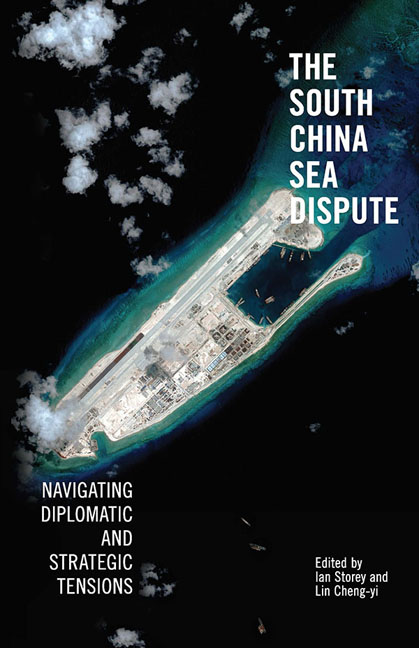Book contents
- Frontmatter
- Contents
- About the Contributors
- 1 Introduction
- 2 Untangling a Complex Web: Understanding Competing Maritime Claims in the South China Sea
- 3 China Debates the South China Sea Dispute
- 4 Taiwan's Evolving Policy towards the South China Sea Dispute, 1992–2016
- 5 The South China Sea: Primary Contradictions in China–Southeast Asia Relations
- 6 Rising Tensions in the South China Sea: Southeast Asian Responses
- 7 The Philippines and the South China Sea Dispute: Security Interests and Perspectives
- 8 A Vietnamese Perspective on the South China Sea Dispute
- 9 The South China Sea Dispute: Options for Malaysia
- 10 The United States and the South China Sea: Front Line of 228 Hegemonic Tension?
- 11 The South China Sea Dispute in U.S.–ASEAN Relations
- 12 Japan and the South China Sea Dispute: A Stakeholder's Perspective
- 13 Conclusion
- Index
10 - The United States and the South China Sea: Front Line of 228 Hegemonic Tension?
Published online by Cambridge University Press: 19 May 2017
- Frontmatter
- Contents
- About the Contributors
- 1 Introduction
- 2 Untangling a Complex Web: Understanding Competing Maritime Claims in the South China Sea
- 3 China Debates the South China Sea Dispute
- 4 Taiwan's Evolving Policy towards the South China Sea Dispute, 1992–2016
- 5 The South China Sea: Primary Contradictions in China–Southeast Asia Relations
- 6 Rising Tensions in the South China Sea: Southeast Asian Responses
- 7 The Philippines and the South China Sea Dispute: Security Interests and Perspectives
- 8 A Vietnamese Perspective on the South China Sea Dispute
- 9 The South China Sea Dispute: Options for Malaysia
- 10 The United States and the South China Sea: Front Line of 228 Hegemonic Tension?
- 11 The South China Sea Dispute in U.S.–ASEAN Relations
- 12 Japan and the South China Sea Dispute: A Stakeholder's Perspective
- 13 Conclusion
- Index
Summary
From the standpoint of the United States, the rise of the People's Republic of China (PRC) presents two archetypal possibilities. The first possibility is that China will conform to international norms; will not bully smaller countries; will not seek to dominate the Asia-Pacific region; will not try to overthrow international arrangements that most of the world wants to keep; and will not try to supplant U.S. influence in East Asia. The second possibility is that China will, contrary to its rhetorical promises, strive for regional hegemony; seek to displace the United States from its current position as the strongest strategic player in the region; and use its massive advantages in economic, diplomatic and military weight to pressure or coerce smaller countries to subordinate their own interests to Chinese preferences.
This dichotomy is built into the U.S. policy of hedging which attempts to simultaneously encourage the first outcome while defending against the second outcome. This is somewhat contradictory, since “unfriendly” U.S. policies that imply China is a potential adversary undercut China's confidence that it can achieve its economic and security goals in a region and a world permeated with so many U.S.-sponsored rules and arrangements.
The same dichotomy is also visible in the brief summary of U.S.–China policy that is little changed over the last three presidential administrations, and was recently restated by President Barack Obama as follows:
We welcome China's rise.… [It's] good for the world, and it's good for America. We just want to make sure that that rise occurs in a way that reinforces international norms and international rules, and enhances security and peace, as opposed to it being a source of conflict either in the region or around the world.
In the South China Sea, this dichotomy emerges over the question of whether the disputes will be settled on the basis of modern international law, as the United States wishes, or on the basis of the principle that the dominant regional power sets the guidelines for international affairs. The latter model prevailed for much of pre-modern history, with China in the dominant position and many of the other regional states more or less acquiescing. Some analysts argue that the China-centric model is the natural state of affairs for East Asia, both past and future.
- Type
- Chapter
- Information
- The South China Sea DisputeNavigating Diplomatic and Strategic Tensions, pp. 228 - 246Publisher: ISEAS–Yusof Ishak InstitutePrint publication year: 2016

